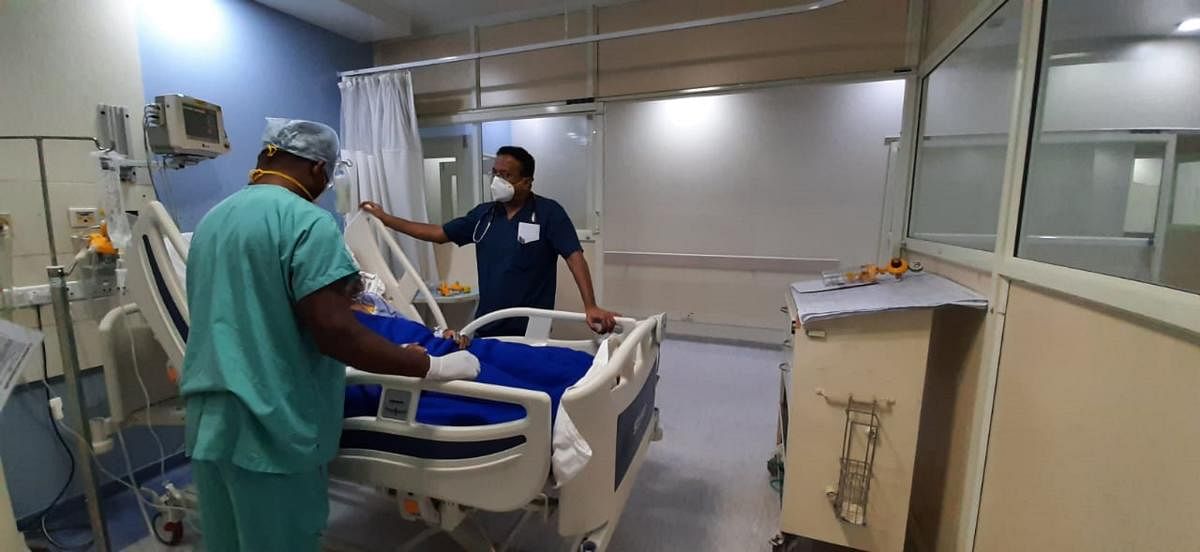
July 1 was observed as National Doctor’s Day. Metrolife spoke to senior doctors about challenges they faced during Covid second wave and what they’re expecting ahead.
Dr Ramesha K T, professor and head of the department, plastic surgery and burns, Victoria Hospital, says doctors from the burns department were also posted on Covid duty.
“We get around 50 to 70 burns dressing cases every day and the burns ward had to be active. When the second wave happened, our doctors were put on rotation, so managing work in our department and the Covid wing was challenging yet educative. Wearing a PPE kit for six hours and working is quite tiring,” he adds.
The mortality rate of the second wave was depressing, Dr Ramesha says. It was a training period and a possible third wave will not be as challenging, he notes. “Most doctors have overcome their fears. Since a lot of doctors now have done Covid duty and there is better preparedness, it won’t be hard to manage patients and resources,” he says.
‘Chalking guidelines for next’
Despite learning about Covid-19 from the first wave, the second wave was stressful.
Dr Arjun Alva, head of the critical care department at a private hospital, says that the Covid ICU had been closed down, and the second wave shocked everyone. “Within 15 days, the hospital was filled with Covid patients. Despite proning and trying various things, there were around 330 deaths in three months,” he says.
His team treated around 5,000 patients from May to December 2020. “We treated around 4,000 patients from April to June 2021,” he adds.
Though the hospital wasn’t short-staffed and had enough infrastructure to handle the second wave, dealing with young parents and families was mentally exhausting.
Most medical facilities are better prepared for the third wave, says Dr Arjun. “We have regular Zoom calls every three weeks about how to deal with it. We are chalking out guidelines about paediatric care, which departments will take the forefront etc,” he says.
‘Frantic calls at 3 am’
While preparation for the first wave was optimal, it was suboptimal, for the second one, points out Dr Pradeep Rangappa, critical care senior consultant at a private hospital, and an expert member of the BBMP Covid-19 committee.
“Despite strong signals, the administrative functionary failed, there was sheer callousness. Historically, it is known that for any pandemic, the second wave will be bad. In Covid-19, it was observed across countries,” he says.
Every doctor faced ethical dilemma, about not being able to provide care for the deserving, including their own family members. “We struggled to find ICU beds for our own families. Availability of drugs and resource allocation was a huge issue,” he says.
People frantically called for help, there were calls at 3 am. “It was overwhelming,” he says.
Amidst all chaos, healthcare professionals had to be regularly updated about nuances of new evolving medical treatments.
The third wave will not be as bad, he says. “We have to learn lessons from history. All the hype about paediatrics getting affected is a farce, according to me. The third wave will be blunted. We will be overprepared and might not use as many resources,” he adds.
‘Most hospitals have enough ICU beds’
In 2020, Covid patients were sent to Rajiv Gandhi Institute of Chest Diseases (RGICD), before there were dedicated Covid hospitals. In the second wave, RGICD that is dedicated to SARI cases, saw almost 90 to 95% of their patients turning Covid positive.
Dr C Nagaraj, director, RGICD says, “Since there was a shortage of beds, we often treated them at our hospital itself. We had a three-tier system — ward dedicated to SARI cases, Covid-19 and non-Covid cases. We got support from Bengaluru Medical College and our staff had to be divided into batches.”
Though the government and healthcare system did not expect such a spike in cases in 2021, a possible third wave will be dealt with well.
“Now, most hospitals have enough ICU and ventilator beds. The government is meticulously planning now with a special committee,” he adds.
Check out DH latest videos: